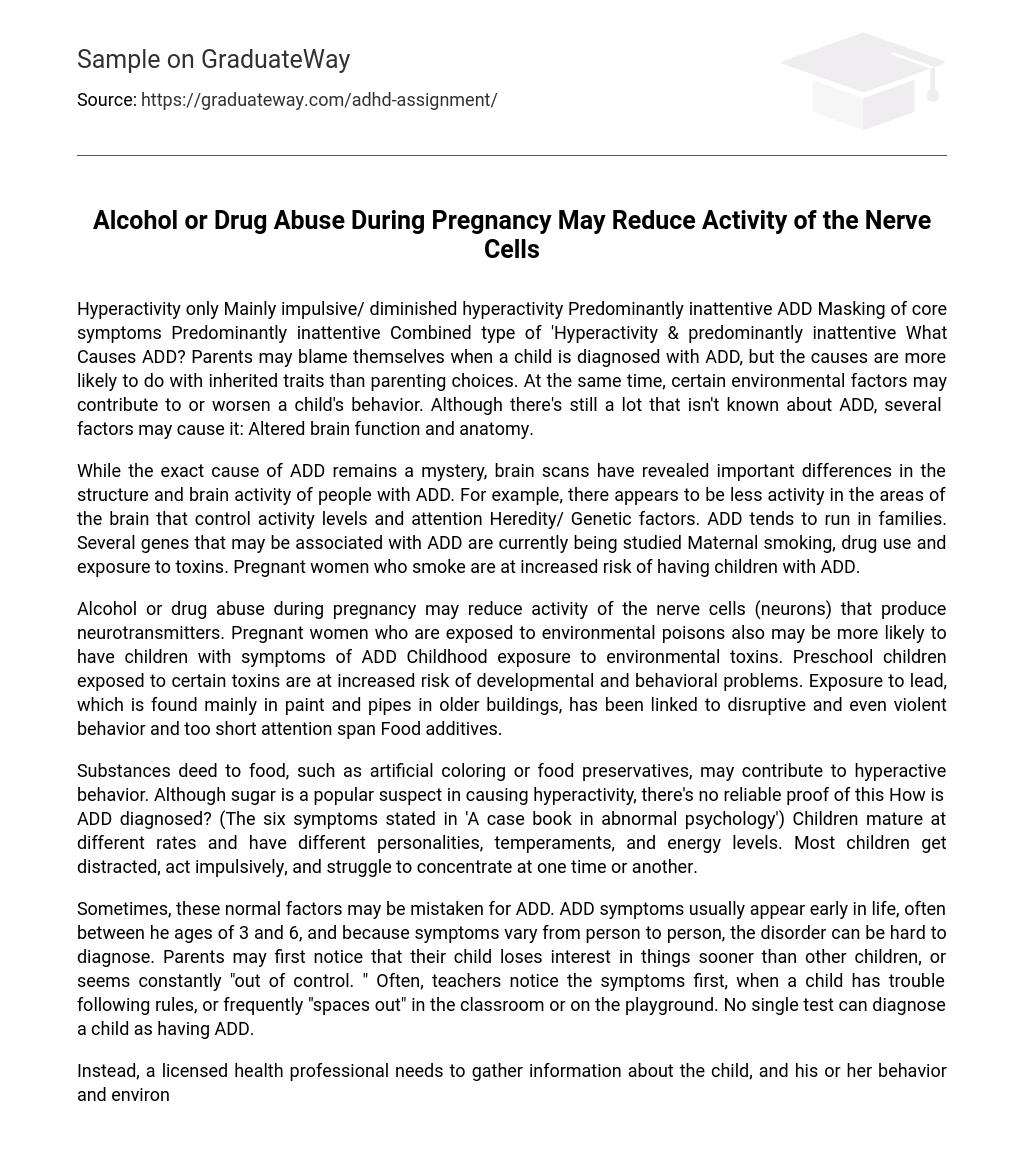Hyperactivity only Mainly impulsive/ diminished hyperactivity Predominantly inattentive ADD Masking of core symptoms Predominantly inattentive Combined type of ‘Hyperactivity & predominantly inattentive What Causes ADD? Parents may blame themselves when a child is diagnosed with ADD, but the causes are more likely to do with inherited traits than parenting choices. At the same time, certain environmental factors may contribute to or worsen a child’s behavior. Although there’s still a lot that isn’t known about ADD, several factors may cause it: Altered brain function and anatomy.
While the exact cause of ADD remains a mystery, brain scans have revealed important differences in the structure and brain activity of people with ADD. For example, there appears to be less activity in the areas of the brain that control activity levels and attention Heredity/ Genetic factors. ADD tends to run in families. Several genes that may be associated with ADD are currently being studied Maternal smoking, drug use and exposure to toxins. Pregnant women who smoke are at increased risk of having children with ADD.
Alcohol or drug abuse during pregnancy may reduce activity of the nerve cells (neurons) that produce neurotransmitters. Pregnant women who are exposed to environmental poisons also may be more likely to have children with symptoms of ADD Childhood exposure to environmental toxins. Preschool children exposed to certain toxins are at increased risk of developmental and behavioral problems. Exposure to lead, which is found mainly in paint and pipes in older buildings, has been linked to disruptive and even violent behavior and too short attention span Food additives.
Substances deed to food, such as artificial coloring or food preservatives, may contribute to hyperactive behavior. Although sugar is a popular suspect in causing hyperactivity, there’s no reliable proof of this How is ADD diagnosed? (The six symptoms stated in ‘A case book in abnormal psychology’) Children mature at different rates and have different personalities, temperaments, and energy levels. Most children get distracted, act impulsively, and struggle to concentrate at one time or another.
Sometimes, these normal factors may be mistaken for ADD. ADD symptoms usually appear early in life, often between he ages of 3 and 6, and because symptoms vary from person to person, the disorder can be hard to diagnose. Parents may first notice that their child loses interest in things sooner than other children, or seems constantly “out of control. ” Often, teachers notice the symptoms first, when a child has trouble following rules, or frequently “spaces out” in the classroom or on the playground. No single test can diagnose a child as having ADD.
Instead, a licensed health professional needs to gather information about the child, and his or her behavior and environment. A family may want to first talk with the child’s pediatrician. Some pediatricians can assess the child themselves, but many will refer the family to a mental health specialist with experience in childhood mental disorders such as ADD. The pediatrician or mental health specialist will first try to rule out other possibilities for the symptoms. For example, certain situations, events, or health conditions may cause temporary behaviors in a child that seem like ADD.
Between them, the referring pediatrician and specialist will determine if a child: Is experiencing undetected seizures that could be associated with there medical conditions Has a middle ear infection that is causing hearing problems Has any undetected hearing or vision problems Has any medical problems that affect thinking and behavior Has any learning disabilities Has anxiety or depression, or other psychiatric problems that might cause ADD-like symptoms Has been affected by a significant and sudden change, such as the death of a family member, a divorce, or parent’s job loss.
A specialist will also check school and medical records for clues, to see if the child’s home or school settings appear unusually stressful or disrupted, and gather information from the child’s parents and teachers. Coaches, babysitters, and other adults who know the child well also may be consulted. The specialist also will ask: Are the behaviors excessive and long-term, and do they affect all aspects of the child’s life? Do they happen more often in this child compared with the child’s peers? Are the behaviors a continuous problem or a response to a temporary situation? Do the behaviors occur in several settings or only in one place, such as the playground, classroom, or home? The specialist pays close attention to the child’s behavior during different situations. Some situations are highly structured, some have less structure. Others would require the child to keep paying attention.
Most children with ADD are better able to control their behaviors in situations where they are getting individual attention and when they are free to focus on enjoyable activities. These types of situations are less important in the assessment. A child also may be evaluated to see how he or she acts in social situations, and may be given tests of intellectual ability and academic achievement to see if he or she has a learning disability.
Finally, if after gathering all this information the child meets the criteria for ADD, he or she will be diagnosed with the disorder. From http://www. NIMH. NIH. Gob/health/publications/attention-deficit-hyperactivity -disorder/how-is-add-diagnosed. SHTML Treatments Medication management alone Behavior treatment alone Combination of both Routine community care In each of the study sides, three groups were treated for the first fourteen months, in a specified protocol and the fourth group were referred for the immunity treatment of the parents choosing.





